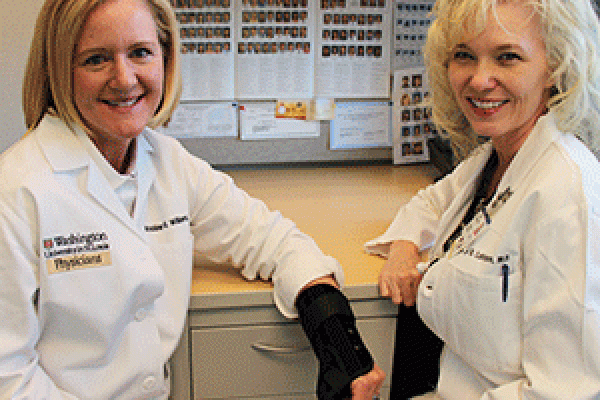Anesthesiology launches collaboration with hospital in Ghana
The Department of Anesthesiology has established a partnership with a hospital in Ghana to help improve medical care in that African nation while providing training opportunities for residents and fellows. Pictured is Ellen Lockhart, MD, of the School of Medicine, alongside Divine Kwami, MD, a faculty member at the Korle Bu Teaching Hospital in Ghana.
Study suggests private NICU rooms may influence preemies’ development
Premature babies often spend their first months of life in neonatal intensive care units (NICUs) — environments that, in recent years, have seen transformations, with hospitals adding private rooms to NICUs in place of open wards. But research at the School of Medicine adds new information to the discussion over what is the optimal setting for infants in the NICU. Shown is the study’s first author, Bobbi Pineda, PhD, in the NICU at St. Louis Children’s Hospital.
Children’s Discovery Institute awards $2.4 million
As part of ongoing efforts to bolster pediatric research and lead to new discoveries, Children’s Discovery Institute plans to award more than $2.4 million to research initiatives at Washington University School of Medicine in St. Louis and St. Louis Children’s Hospital.
Cole elected to March of Dimes national board
F. Sessions Cole, MD, the Park J. White, MD, Professor
and vice chair of the Department of Pediatrics at Washington University
School of Medicine in St. Louis, has been elected to the March of Dimes
National Board of Trustees.
Splints favored for kids’ forearm buckle fractures
When children fall and try to catch themselves with an outstretched hand, they can suffer “buckle fractures,” forearm injuries traditionally treated with casts. But new research shows that removable splints are cpreferred by patients and parents, building on earlier findings that such splints are just as effective as casts. Shown are study co-authors Kristine G. Williams, MD, holding a splint, and Janet D. Luhmann, MD.
Children’s Discovery Institute Awards $2.7 million in pediatric research grants
Eleven Washington University research teams will share $2.7 million in new grants from the Children’s Discovery Institute, a research collaboration between St. Louis Children’s Hospital and Washington University School of Medicine.
TV series set at St. Louis Children’s Hospital to air
A documentary-style series highlighting patients, faculty physicians and other staff at St. Louis Children’s Hospital will debut Saturday, March 16, on KSDK. “The Frontline for Hope” will air Saturday nights for the next six weeks. Shown is one of the camera crew taping outside the hospital.
Cooling may prevent trauma-induced epilepsy
In the weeks, months and years after a severe head
injury, patients often experience epileptic seizures that are difficult
to control. A new study in rats suggests that gently cooling the brain
after injury may prevent these seizures.
Antibiotics cut death rates for malnourished kids
Severely malnourished children are far more likely to recover and survive when given antibiotics along with a therapeutic peanut-butter based food than children who are treated with the therapeutic food alone, researchers at Washington University School of Medicine in St. Louis have found. Indi Trehan, MD, the study’s lead author, shows parents in Malawi how to measure medication.
Pediatric program for brain injuries saves lives, reduces disabilities
Children with traumatic brain injuries are more likely to survive and avoid long-term disabilities when treated with an aggressive approach involving neurologists, neurosurgeons and other critical-care specialists, a new study shows. St. Louis Children’s Hospital patient Drew Mitchem, injured in a sledding accident, had a full recovery after the protocol was followed in his treatment.
View More Stories

